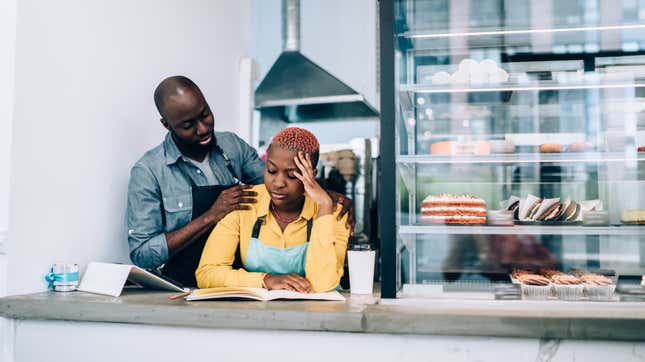
The coronavirus pandemic is having a devastating effect on small businesses across the country, but black-owned businesses are likely to feel it more severely—and for a longer period of time.
“Black people represent about 13 percent of the population But only 4.3 percent of the nation’s 22 million business owners,” Andre Perry, a fellow at the Metropolitan Policy Program at the Brookings Institution, told The Root. He explained that the types of businesses black people tend to own make them more vulnerable to the pandemic.
“There’s more of us in the face-to-face serving businesses,” said Perry. “So barber shops, beauty salons, restaurants in a local community. And so, you’re seeing the social distancing mechanism really hurt us more than others.”
Hair salons, in particular, have a tough time implementing social distancing. Natural hair salon Loc Lov had a robust business at its two-story DC location, and recently opened a location in Los Angeles. Owner Salih Watts has spent the last few weeks in the LA location, where appointments fell in the days before California was put on lockdown, dropping from 15-20 per week to zero.
“There’s nobody,” said Watts. “So our LA location is just done.” In terms of his DC location, Watts said he’s keeping his fingers crossed. Business there has been just 15-20% of normal.
“I’m nervous about the money that I know that we need to bring in. And the money that we’ve been bringing in over these past days doesn’t match up.”
While chatting with me, Watts was baking bread, hoping to work with a local friend who owned a cafe to maybe sell some sandwiches.
“We were just featured in Essence Magazine as one of the top [natural salons] in the country, and we can very well just be out of business in a very short amount of time,” he said. “How do you prepare for that?”
Stories like Watts’ are disheartening, especially since before the outbreak, black business ownership has been improving, said Renee Johnson of the small business advocacy group, Main Street Alliance.
The country was “seeing a surge of black businesses, especially black women [owned] businesses,” Johnson told me. “They’re the number one entrepreneurs and setting up shops and creating job opportunities for people across the country.”
Natasha Crosby, a realtor in Richmond, Virginia, was set up for a good year heading into the spring buying season.
“Real estate has been booming here in the Richmond area. The big issue that we were having was one of low inventory,” said Crosby, who is an independent contractor with Clock Tower Realty, “and now it has just stopped.”
Potential sellers are hesitant to hold open houses where strangers with unknown health statuses can tramp through their homes. But with low-interest rates and limited supply, there are still some buyers…for now. For them, Crosby carries around a full sanitation kit with gloves, wipes, and sanitizer.
Meanwhile, there are “essential” businesses—grocery stores, gas stations, and banks that stay open even when there is a lockdown. Yet, Teri Williams, CEO of OneUnited Bank, the largest black-owned bank in the country, warned that even though their staff is still working, the economic effect is definitely coming.
“We have a lot of minority customers, and a lot of them have supplemented their income with gigs,” she said. “And we believe that [the] gig economy is also going to be impacted in this at this time.”
Johnson at Main Street Alliance expects the broader black community will feel the effects of the COVID-19 outbreak longer than others, since black workers tend to be overrepresented in certain “essential” industries, especially low-wage jobs like home health care aides and grocery store workers.
“They’re still at work, and so the community is not able to safely quarantine or social distance,” she explained. “So it’s going to have a lingering impact, especially to low income and communities of color.”
In North Minneapolis, K.B. Brown owns one of two black-owned printing companies in the state, Wolfpack Promotionals. He had to lay off his three employees about a week ago.
Brown’s business was already struggling due to the trade war, and now stacks of orders—key chains, mugs, t-shirts—sit uncollected on his shelves as corporate clients trim discretionary spending.
He and his co-owner wife are two months behind on the mortgage for their Minneapolis shop, and now have to think about the mortgage on their own home.
“Within the next couple of weeks, we’re going to have to make a couple [of] hard decisions,” Brown told The Root. “I mean, we can’t keep racking up utility bills here.”
Especially since it’s unclear how long this crisis will last.
“We have no idea,” he said. “Uncertainty is what we live in now.”

